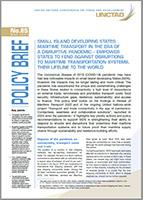
The coronavirus disease of 2019 (COVID-19) pandemic may have had less noticeable impacts on small island developing states (SIDS). However, the impacts may be longer lasting and more critical.
The pandemic has exacerbated the unique and overwhelming challenges in these states related to connectivity; a high level of dependence on external trade; remoteness and prohibitive transport costs; food security; infrastructure gaps; resilience; sustainability; and access to finance.
This policy brief builds on the findings in the Review of Maritime Transport 2020 and of an ongoing United Nations-wide project, Transport and trade connectivity in the age of pandemics: Contactless, seamless and collaborative solutions, launched in 2020 amid the pandemic.
It highlights key priority actions and policy recommendations to support SIDS in strengthening their ability to respond to shocks and disruptions that undermine their maritime transportation systems and to future proof their maritime supply chains through sustainability and resilience-building efforts.
Key points:
-
The pandemic has laid bare the vulnerabilities of the entire maritime transport sector and severely tested the resilience of supply chains worldwide, including among SIDS.
-
As maritime transport is the lifeline of SIDS, supporting economic performance, trade and productive sectors, such as tourism and fisheries, related impacts in these states are expected to be wider and potentially far more damaging than in other States, in particular as multiple crises or shocks could occur at the same time.
-
Many states could experience associated impacts from the pandemic for years to come if appropriate action is not taken to support and sustain them.
-
From a maritime transport perspective, enhancing the ability to respond to and recover from disruptive shocks in the future, including pandemics, requires addressing sustainability and resilience issues along with financial, technological and capacity-related gaps.
-
This policy brief presents recommended priority actions to enhance capacity to address disruptions to maritime transportation systems and to pursue a sustainable and resilient recovery in the maritime sector.


